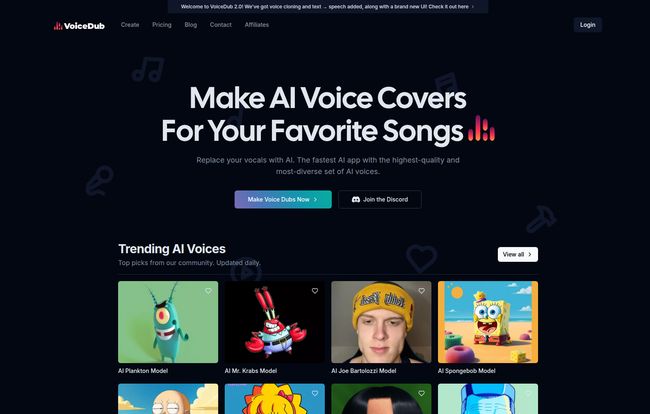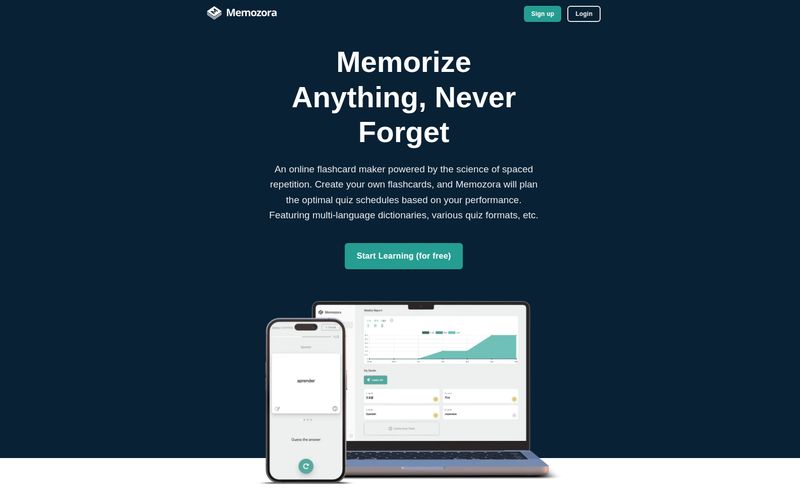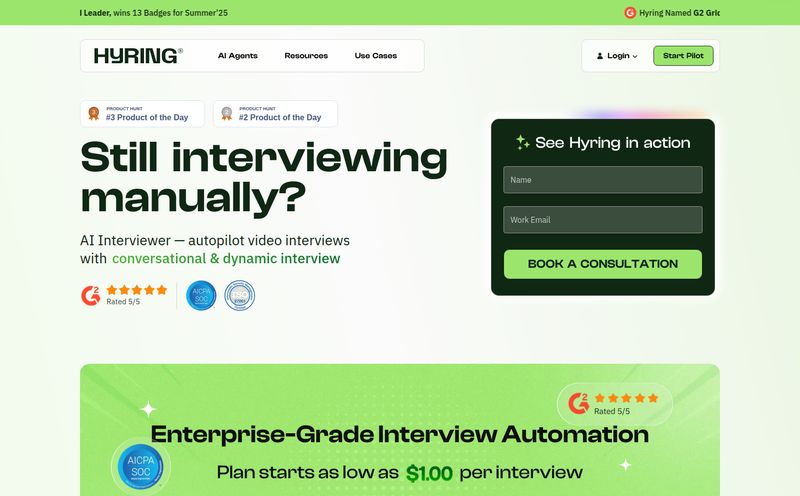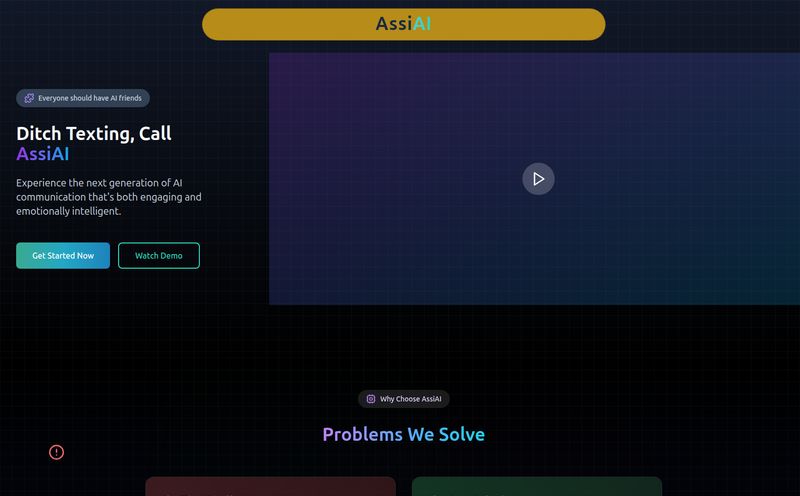You’ve seen them. I’ve seen them. We’ve all seen them. Scroll through TikTok or YouTube Shorts for more than 30 seconds, and you’re bound to find one: Plankton from Spongebob belting out a Sinatra classic, or maybe a US president rapping a chart-topping hit. It’s a weird, wild corner of the internet, and I’m kinda here for it. For a while, I just assumed it required some black magic-level video editing and audio engineering skills. Turns out, not so much.
The secret sauce for a lot of this content is a new breed of AI tools, and one name that keeps popping up is VoiceDub.ai. As someone who’s been neck-deep in SEO and traffic generation for years, I know a trend when I see one. Viral content is the holy grail, and tools that make it accessible to everyone? That gets my attention. So, I decided to pull back the curtain, sign up, and see if VoiceDub is legit or just another flash-in-the-pan AI gimmick. This is my no-fluff, hands-on take.
What Exactly is VoiceDub.ai Anyway?
Let's get this straight first. VoiceDub isn’t just a simple voice filter you’d find on Instagram. It’s a full-blown AI vocal replacement platform. Think of it like a vocal chameleon that lives in your browser. You take a song, upload it, and the AI strips out the original vocals. Then, the magic happens. You can choose from a library of AI-generated voices—ranging from cartoon characters to famous singers—and have them “sing” the song instead. The result? Homer Simpson singing Adele. Seriously.
But it's more than just a meme machine. The platform is built on three core pillars: creating AI voice covers, cloning voices, and converting text to speech. This combination makes it surprisingly versatile, moving it from a simple toy to a potentially powerful tool for content creators.

Visit VoiceDub
The Features That Actually Matter
A pretty interface is nice, but we're here for the engine under the hood. What can this thing actually do? I messed around with the main features, and here's the breakdown.
Creating AI Voice Covers in a Flash
This is the main event, the reason most people show up. And I have to admit, it’s ridiculously easy. You basically upload an audio file (or paste a YouTube link), the tool removes the vocals for you, and then you pick a new “singer” from their library. Their library is… extensive. You’ve got your popular AI voices, the trending ones, and a whole bunch of others that get updated pretty frequently. The first thing I did was make a cartoon character sing a 90s rock anthem. The results were both cursed and brilliant, which is exactly what I hoped for.
For a content creator, the potential here is obvious. You can churn out funny, shareable social media clips in minutes. Its a wild time to be a creator.
Cloning Your Own Voice (or Anyone Else’s?)
Okay, this is where things get really interesting—and a little bit Black Mirror. VoiceDub has a voice cloning feature. You can upload samples of a voice, and the AI will create a model of it that you can then use on any track. The platform even boasts a “v2 Instant Voice Cloning” feature for its paid users, which promises faster and more accurate results.
From a professional standpoint, this is powerful. Imagine creating voiceovers for your videos in your own voice without ever having to speak into a microphone. You could fix a mistake in a podcast recording by just typing the correct words. The efficiency is undeniable. But of course, there's the big, looming ethical question. We all remember the AI-generated Drake song that went viral last year, sparking a massive debate. While VoiceDub is a tool, how people use it walks a fine line. It's the wild west of AI right now, and while the creative possibilities are thrilling, it’s something to be mindful of.
More Than Just Singing with Text-to-Speech
I almost overlooked this feature, but I’m glad I didn’t. The text-to-speech (TTS) tool is surprisingly robust. You can type out any script, select one of the AI voices, and it generates an audio file. This is perfect for YouTube video narration, ad reads, or even just making announcements for a Discord server in a celebrity’s voice for fun. It’s a solid addition that adds another layer of utility beyond just making music covers.
Let's Talk About the User Experience
The website itself is clean. Dark mode, straightforward navigation—you’re not going to get lost. They claim “lightning fast” processing, and in my tests, it was pretty quick. A three-minute song was processed and dubbed in just a couple of minutes. Is it instantaneous? No, AI needs time to think, but it’s fast enough that you won't get bored and wander off. One of my favorite little details is the promise of “daily updates.” In the fast-moving world of AI, a platform that isn’t constantly improving is already dead. Seeing that commitment is a big green flag for me.
The All-Important Question: What Does VoiceDub Cost?
Alright, let's talk money. Nothing's ever truly free, right? VoiceDub operates on a subscription model, and they have a few tiers to choose from. I appreciate the transparency here.
| Plan | Price | Best For |
|---|---|---|
| Basic | $2.99 / week | The curious user who wants to try it out for a week or two without a monthly commitment. Good for making a few viral clips. |
| Influencer | $4.99 / month | In my opinion, this is the sweet spot. You get a generous 100 dubs and 20 voice clones per month, plus faster processing. Ideal for most content creators. |
| PRO | $49.99 / month | The power user. This is for agencies, dedicated AI music channels, or people who need custom models and priority support. The limits are sky-high. |
That weekly billing on the Basic plan is a bit odd, but I get it—it lowers the barrier to entry. For my money, the Influencer plan at five bucks a month is a no-brainer if you plan on using this regularly. The value you get for that price is pretty incredible, especially with the v2 cloning included.
The Not-So-Perfect Side of VoiceDub
No tool is perfect, and it’d be dishonest to pretend otherwise. While I was generally impressed, there are a few things to keep in mind. First, the generation times can vary. One dub might take a minute, the next might take five. It's the nature of the beast when you're sharing server resources. Also, the quality can sometimes be… unpredictable. Most of the time it’s great, but occasionally you get an artifact or a weirdly pronounced word. It's not a dealbreaker, but it’s not flawless either.
The biggest potential issue is the voice library itself. The availability of specific popular voices can be volatile. A voice might be there one day and gone the next, likely due to copyright claims or other external pressures. This isn't really VoiceDub's fault, but it's a reality of the space. If your entire content strategy relies on one specific copyrighted voice, you might be in for a rude awakening.
My Final Verdict: Is VoiceDub Worth Your Time and Money?
So, what’s the final word? Yes, for the right person, VoiceDub is absolutely worth it.
If you're a social media manager, a meme creator, a YouTuber, or just someone who loves to experiment with new creative tech, this tool is a playground. It’s easy to use, reasonably priced, and capable of producing genuinely entertaining content with very little effort. It democratizes a process that used to be incredibly complex.
Is it for a professional music producer trying to create a Grammy-winning album? Probably not. The technology isn't quite there yet for that level of pristine quality. But for 99% of the use cases out there—creating engaging, fun, and potentially viral content—VoiceDub hits the nail on the head. It's a fantastic example of AI being used not to replace creativity, but to give more people a chance to express it.
Frequently Asked Questions
- How does VoiceDub's voice cloning work?
- You provide clean audio samples of a voice (without background music). The AI analyzes these samples to learn the unique characteristics—pitch, tone, and cadence—and then creates a digital model of that voice that you can use to sing or speak anything you want.
- Is it legal to use celebrity voices for AI covers?
- This is a major gray area right now. Laws are still catching up to the technology. While creating content for personal use or parody is often tolerated, using a celebrity's voice for commercial purposes without permission could lead to legal trouble. It's best to be cautious and consult legal advice if you plan to monetize these covers heavily.
- Can I use the royalty-free voices for commercial projects?
- Yes! VoiceDub provides a selection of royalty-free AI voices specifically for this purpose. These are great for creating original music or commercial voiceovers without worrying about copyright issues.
- What is the vocal remover tool?
- It's a built-in feature that automatically isolates and removes the original vocals from a song. This creates an instrumental or a-cappella track, which is the necessary first step before you can apply a new AI voice. It's included for free with the plans.
- How is VoiceDub different from other AI voice generators?
- Many AI voice tools are focused solely on text-to-speech for narration. VoiceDub's main strength is its focus on music and singing, combining vocal removal, a library of singing voices, and voice cloning into one streamlined platform designed for creating AI covers.
A New Era for Creators
Tools like VoiceDub.ai are more than just a novelty; they represent a shift in content creation. They lower the technical barriers, allowing creativity to be the main driver. Whether you're making a silly meme or prototyping a vocal line for a new song, the power at your fingertips is pretty amazing. It’s an exciting, and slightly chaotic, time to be a creator, and I for one am excited to see what people build with this stuff. Now if you'll excuse me, I have an idea for a sea sponge singing heavy metal.



